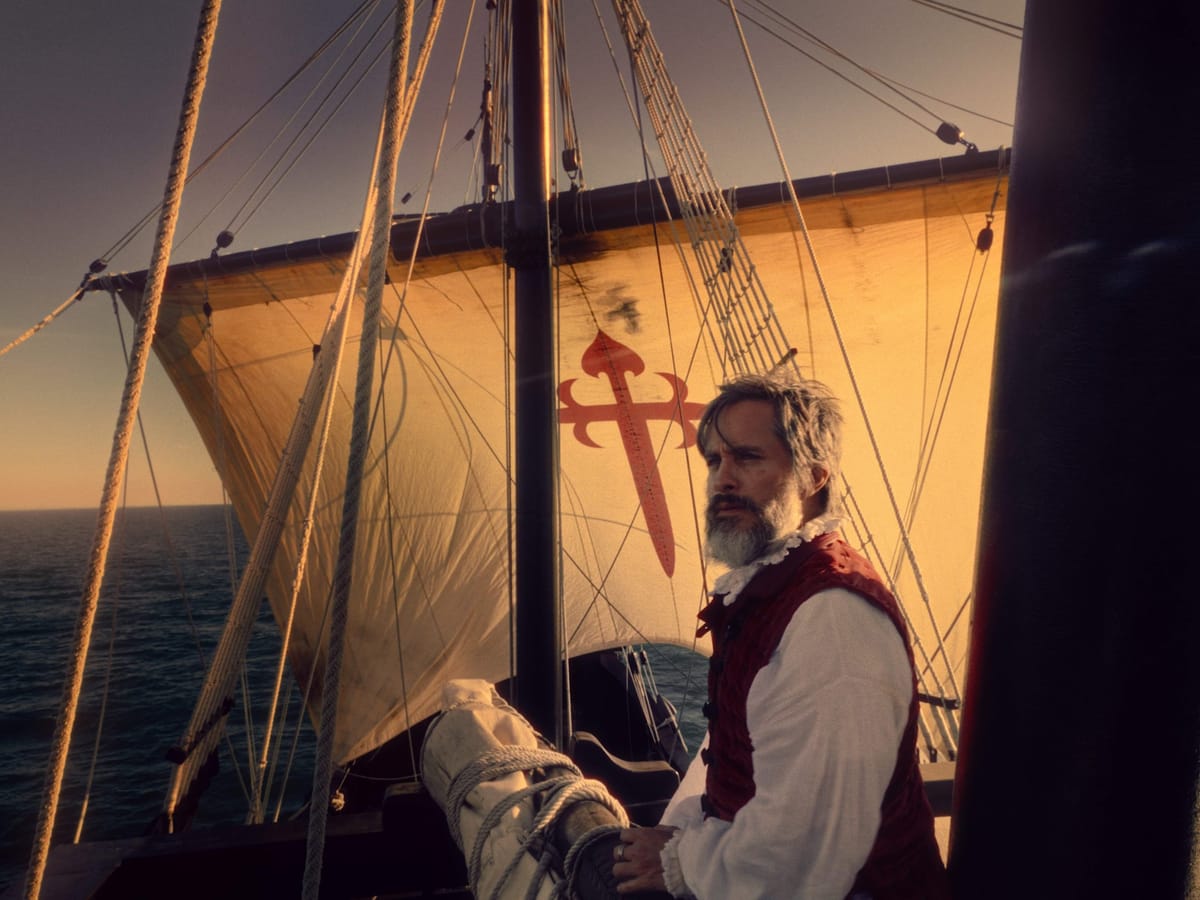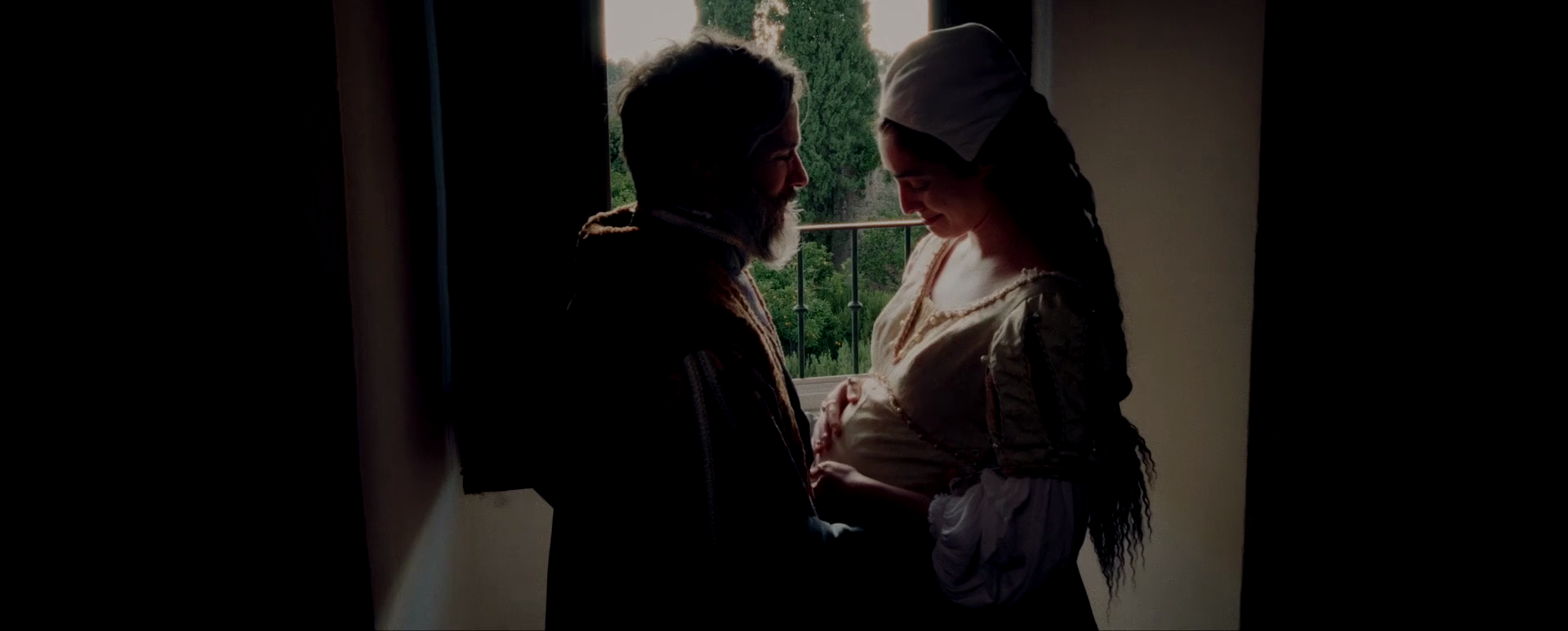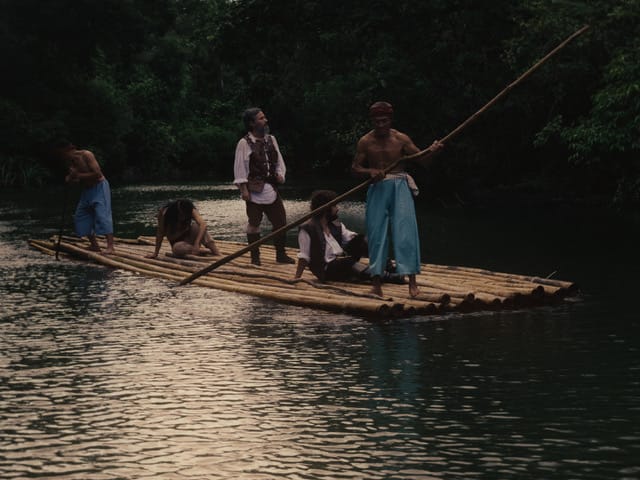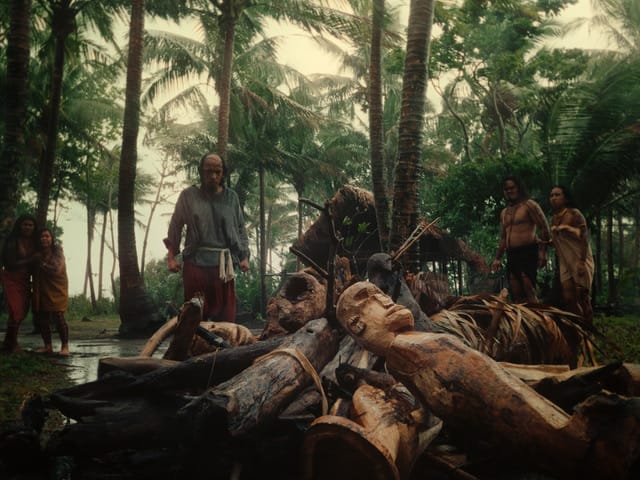NZIFF 2025 Craccum Coverage | Magellan (Part One)
A colonial epic gutted by market demands...

This review is split into two parts. The first part will outline my immediate judgments of the film, while the second part will focus more on the theoretical basis of Lav Diaz's style and its cinematic limits/affordances. The second part will be published soon…

Part One
Initial Reactions
Lé Baltar's interview with Lav Diaz and Hazel Orencio for Rolling Stone Philippines vindicates my frustration and disappointment with Lav's new film, Magellan, his first feature film shot in colour since Norte, the End of History (2013). I've taken the liberty of translating sections of the Tagalog interview shown throughout this review into English.
Baltar: Lav, you already mentioned earlier that you had a plan for a nine-hour cut of the movie, but, of course, the version submitted to Cannes is only about three hours. Did you have a hand in editing the Cannes version, or was it totally the decision of the producers?
Diaz: It's a rough cut. My original cut was three hours, then they shortened it even more.
Baltar: And how did you wrestle with that kind of adjustment, considering the artistic control that you have?
Diaz: It was honestly very hard, but you have to accept it. The shorter version is another film. It’s not a short film. The nine-hour film later, or maybe ten hours, it's another film.
You'll be hard-pressed to find any reviews anywhere complaining about the film being 'short' despite the two and a half hour runtime. This perspective I inhabit might not translate well to those who haven't been exposed to Diaz's cinema before, but even more so to mutuals I know who've seen the film and still champion it as another exceptional masterpiece from the Filipino filmmaker. Though Lav will say he doesn't consider this a 'short film' by any means, I can't help but feel the exasperation and bridled tension of every single cut in this film being a reluctant decision moored by the invisible demands of the global arthouse film market that Diaz has spent a lifetime fighting against. It's not that Magellan's scenes aren't 'long enough', it's that the narrative scope of Magellan is so deliberately abridged and myopic that it might as well function as a crash course on the story of Ferdinand Magellan's relationship with the Philippine islands divorced from Diaz' typically novelistic and epic ambitions and expressions of Filipino struggle, the same struggle that Diaz patiently dissects across stories spanning even wider temporal periods within intergenerational contexts of political strife and triumph native to his earlier films.
We briskly hop from one point to the next throughout Magellan's journey as if we're skimming chapter headings: from his disheveled return to Portugal from the Malaccas, to marrying his wife Beatriz bearing his child, to his moving to Spain for the king's permission to sail the occidental islands, to his arrival in the Visayas region and warm welcoming by the local Rajah Humabon, until his inevitable death by the hands of 'Lapulapu' who we never see (I'll speak more on the latter further down in this piece.)
'Impressionistic' is too liberal a term to ascribe to Magellan, considering its exhaustive and systematic historical period accuracy of its indigenous and 16th-century colonial sets and costumes. Despite every scene coming one after another with not a word of dialogue spoken minutes at a time, one doesn't necessarily get lost in the chronology of Magellan's troubles and travails, which—notwithstanding the occasional breaks in realism with the spectre of Magellan's wife appearing next to him despite her living thousands of miles away back in Portugal—never feels entirely impenetrable or abstract. The filmic narrative's historically-informed linearity never seems to deviate that far from Lav's necessary coverage of the bare-faced colonialist project of Magellan across the Visayan archipelago.

Refreshingly enough, I don't think I've ever seen a film so invested in depicting pre-colonial Malay customs/culture and their aggressive victimisation and commoditisation as slaves not just for the white man, but for the Indians, the Arabs, and the Chinese. Lav is no stranger to these types of representations in his previous films—I immediately think of From What Is Before (2014) and the village's traditional Malay population's quick exodus amidst the arrival of Christian missionaries and undercover anti-communist government agents—but for the first time with Magellan does he bare these indigenous sorrows and tears through the antiseptic, hyper-pristine sheen of the digital camera. Dark shadows fester and pulse within the lush, verdant jungles, the overcast sky practically blends in with the rivers as the grey mist sandwiches between the two as its textural adhesive. The nude bodies of our Visayan pintados—tattooed indigenous people—seamlessly emerge and disappear from the natural elements seen on-screen: a woman crouched by the river bank collecting water into her vase, warriors armed with spears hunching down on the grass weary of the oncoming Portuguese-Spanish explorers, a babaylan (shaman) kneeling down in the pool of blood of a sacrificed pig, the villagers dancing around the fire raising Magellan's decapitated head as their trophy. One wonders what his monochrome films would have looked like had he shot them across the RGB colour spectrum, an indigenous foil to the natural landscapes of Herzog's Aguirre, the Wrath of God (1972).
Orencio: But at the same time, we couldn't do anything because right after finishing the three-hour cut, this was in January, Lav fell ill. He was diagnosed with tuberculosis.
Diaz: I was vomiting blood.
Orencio: So, the whole time they were editing, we were focusing on Lav because he was sick.
Diaz: When I did the cut, we already sent it in. Then I vomited blood.
Orencio: He didn't tell us for four days that he was vomiting blood. So, by the fourth day, he was showing me his hand, then he said, “Hazel, take me to the hospital.” When I brought him to the hospital, that's it; I was flabbergasted. But he's okay now. He’s under medication.
Diaz: The first time I vomited, truly a river of blood. I showered, it’s all blood, in my nose, my mouth. That first time, I was very close. I was holding the rails of the door in the bathroom. Yeah, sometimes, you romanticize that. Who knew it felt so good to die, no? With blood!
Orencio: No!
Baltar: A lot of artists have died recently, please not so soon, Lav.
Orencio: I give up with him.
Diaz: It magnifies the whole journey in that, “Okay, this is how it's like.” I’ve seen death. Apparently it's not as scary once you're there. Magellan is about death. The only truth in that film is death.
Never before does Lav stress the macabre and desolate atmosphere of colonialist/authoritarian violence more through Magellan than in any other film he has made. The film's opening minutes of Magellan's expedition to the Malaccas does not hold back: countless dead bodies splay themselves across the grassy soil and turbulent shorelines, whether it be massacred Filipinos or ambushed Portuguese crewmen. The spectre of death hovers over the shoulders of Magellan; no one is left unimplicated in the loss of life. Widows of sailors hopelessly dreading the news of their husbands' deaths clamour around Magellan, weeping and wailing for their spouses' whereabouts. Magellan's Filipino translator and slave, Enrique, shares with a fellow sailor his circuitous exchanging of ownership from various slave owners as replacements for the previous slaves who have perished under inhumane labour conditions. Magellan forcefully quells instances of slight disloyalty amongst his crew members through death sentences, executions, and marooning of non-compliant sailors onto unknown islands.
Imperialist crusades deromanticised, naval explorers wracked with moral anxiety and impotence, Lav sets the record straight and exposes the cycle of ignorance that goes through the mind of Magellan's conflicted conscience of reconciling Christianity and colonialism, eased only by his egotistic avarice to reach the 'islands of gold' not with the permission of the Portuguese king, Manuel I, but with the permission of the rival Spanish king, Charles V. Albeit obvious to any native Filipino who has gone through any primary school-level teaching in the motherland, one gets the impression that these depictions become a formality, a "Previously, on…" prelude for what I feel is Lav's most confronting—if not most controversial—proposition that should have been the basis of the entire film: that Lapulapu, the chieftain of Mactan who killed Magellan, was a figment of imagination conjured up by Rajah Humabon to scare away Magellan and his crew from converting the rest of the Visayan territories. According to Lav Diaz, Lapulapu, a figure hailed as a folkloric hero against the encroachment of colonialism, a figure whom then Philippine president Rodrigo Duterte signed an executive order to commemorate April 27th as a national holiday celebrating his victory over Magellan in the Battle of Mactan, does not exist.

Baltar: Most of your films display a profound sense of verisimilitude, if not, a magical realism. Does Magellan possess both qualities? How does the film actually veer away from previous iterations of the Magellan saga? And would you say that this is some sort of rewriting of Magellan’s history
Diaz: I’m very sure that I’ll be accused of revisionism: on who is Lapulapu, the massacres that happened, and the way I invented the story behind Beatriz, the trajectory of the Santo Niño and how it became the biggest icon of the Philippines, and the conversion of the Filipinos. Yeah, I expect that.
But I want that. To create a greater discourse on the issue. Until now—even though there are lots of television series made about Magellan, cinema, books—when you read the books, we keep revising the whole thing. There are some facts that match up. There are some facts that don't follow through. History, truly; it’s a complicated thing.
I think the only thing that I can say is I did my homework with this job. I read a lot in the last seven years. I was reading and reading books about Magellan. You realize so many things that, until now, it’s all the same. We’re still barbaric, we’re still the same. People don't ever really change, even though we’re advancing and advancing. But no, we’re actually retrogressing and retrogressing.
Foreigners will undoubtedly be unaware of the implications of such a bold, heretically anti-nationalistic claim. It's a perspective that I, myself, was caught off guard witnessing in the theatre, and was further perplexed in hearing the smug laughter of the old white couple behind me in reaction to this sudden revelation. That this information is delivered as the very last scene of the film, that any non-Filipinos will come away with this film incapable of grasping why the past two and a half hours functions as the culmination of this film's brave critique of a foundational historical event that virtually informs every single ideology within the historical panoply of the Philippine struggle towards sovereignty and a united cultural identity further inflames my resentment and annoyance at this project's trimming down to meet the prerequisites of its European co-producers. From this perspective, this 165-minute film is an absolute moral failure, a conscious compromise by Lav to wriggle his way back into the graces of the arthouse circles he has long been favoured by and now disrespected. A sadomasochistic relationship made manifest through cinema's colonisers; a disgrace.
In an attempt to kill time in the city before my evening screening of Magellan, I remember stumbling upon a friend working at the box office for NZIFF and conversing with her for hours until her shift was over. In our long conversations, I mentioned briefly my attitudes towards artistic/creative autonomy in this day and age, an attitude that I merely echo from Godard: There is no such thing as a lack of 'good films' than there is an unequal distribution of mediocre, middle-brow films peddled by the few media conglomerates that sanction its sanitised, non-confrontational qualities in proportion to its ROI, which is always skewed to favour the latter if it means generating outwardly rightist, capitalist propaganda if its censoring boards kindly turn the other cheek. I genuinely believe this shortened version of Magellan is not worth your time, and neither was it for Diaz who clearly capitulated to these market demands if it meant delaying his intended edit of the film that will see its release in the near future. Why he continued to push forward with these conditions remains both admirable and concerning to me.
Diaz's nine-hour version cannot arrive any sooner.

MAGELLAN Clip | TIFF 2025

Follow our Letterboxd and Instagram to get live updates and reviews directly from our dedicated student team of film aficionados <3

Disclaimer
The views and opinions expressed in Craccum are those of individual contributors and do not necessarily reflect those of the editorial team or the publication as a whole. While we aim to ensure accuracy and fairness, Craccum cannot guarantee the complete reliability of all information presented and assumes no liability for errors or omissions.







